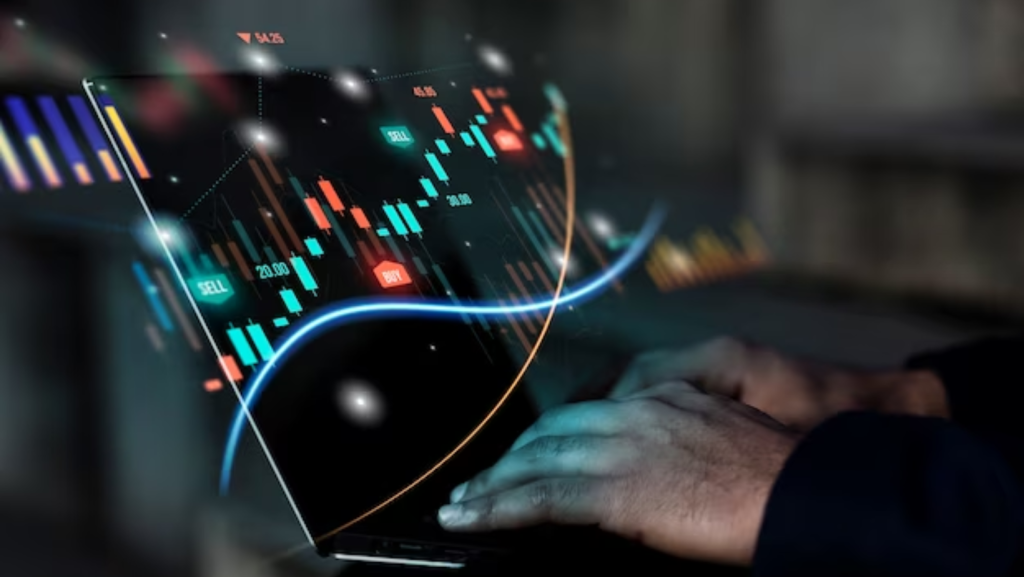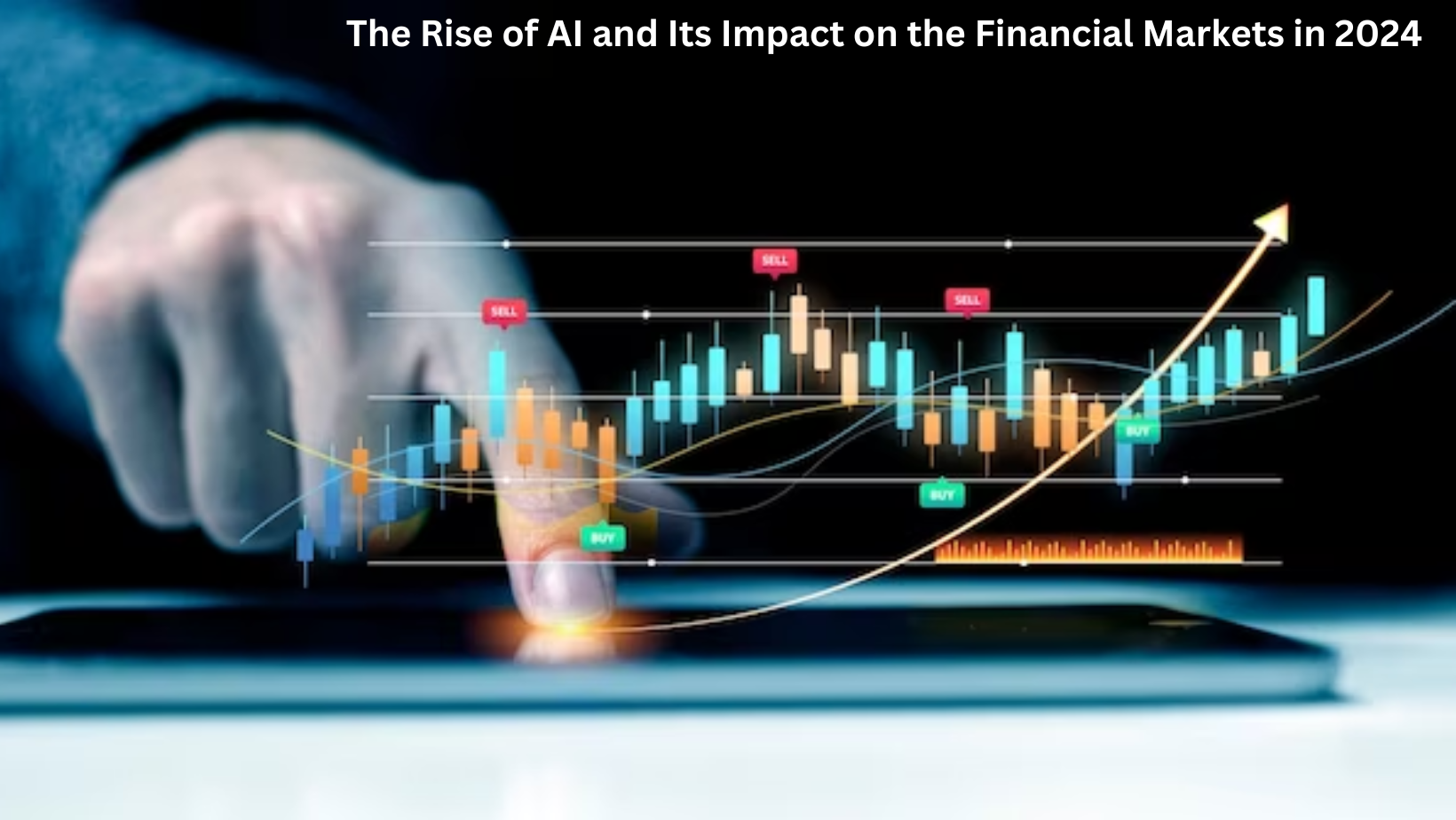In recent years, the financial landscape has undergone a transformative journey, with Artificial Intelligence (AI) emerging as a game-changer. From AI-powered trading to financial risk management, the integration of AI in finance is reshaping the industry. In this blog post, we’ll delve into the profound implications of AI on financial markets, exploring the benefits, risks, and the evolving role of technology in shaping the future of finance.
Introduction: Unveiling the Revolution
The financial world is in the midst of a technological revolution, and at the heart of this revolution is Artificial Intelligence. Imagine a landscape where algorithms make split-second decisions, predict market trends, manage risks, and execute trades at speeds beyond human capability. This blog aims to unravel the impact of AI on financial markets, delving into its various facets and shedding light on the future it promises.

As we navigate through this discussion, we’ll explore the role of AI in stock advisory services, stock market predictions, financial risk management, and its broader implications for the industry. Buckle up as we journey into the dynamic intersection of technology and finance.
AI in Financial Markets: A Paradigm Shift
The integration of AI in financial markets is not just a trend; it’s a paradigm shift that has redefined how the game of finance is played. AI-powered trading platforms have become the new normal, leveraging sophisticated algorithms to analyze massive datasets and make real-time decisions. This seismic shift is not without its challenges, and understanding the implications is crucial for anyone navigating the financial landscape.
For instance, according to Forbes, the future lies in our ability to harness AI’s predictive prowess while safeguarding the human touch.
The Future of AI in Finance: A Glimpse into Tomorrow
What does the future hold for AI in finance? As technology advances, so do the possibilities. From automating mundane tasks to predicting market movements with unprecedented accuracy, AI is set to become an indispensable tool for financial institutions. In this section, we’ll explore the potential benefits and risks associated with the continued integration of AI into the financial industry.

For a comprehensive overview of how AI is shaping the future of finance, Investopedia offers insights into the evolving landscape.
AI and Fintech: A Symbiotic Relationship
The synergy between AI and financial technology (fintech) is undeniable. As the world embraces digital transformation, fintech companies are leveraging AI to enhance user experiences, streamline processes, and offer innovative financial solutions. This section explores the evolving relationship between AI and fintech, shedding light on the collaborative future that lies ahead.
For a deeper dive into the intersection of AI and fintech, MIT Technology Review provides valuable insights into the technological advancements shaping the financial industry.
FAQ: Navigating the AI-Finance Landscape
Q1: How is AI changing the financial industry?
A1: AI is revolutionizing finance by automating tasks, improving decision-making, and enhancing efficiency across various financial processes.
Q2: Can AI predict stock market movements accurately?
A2: While AI can analyze vast amounts of data to make predictions, it’s essential to note that the market is dynamic, and predictions are inherently uncertain.
Q3: What are the benefits of using AI in finance?
A3: AI in finance brings benefits such as improved efficiency, faster decision-making, enhanced risk management, and the ability to analyze large datasets.
Q4: Are there risks associated with AI in finance?
A4: Yes, risks include algorithmic biases, data security concerns, and the potential for overreliance on AI without human oversight.
The Impact of AI on Finance: Weighing the Pros and Cons
As we dissect the impact of AI on finance, it’s essential to weigh the benefits against the risks. AI has undoubtedly brought about positive changes, but it’s not without its challenges. Let’s explore these aspects in detail.
Benefits of AI in Finance:
AI in finance has ushered in a new era of efficiency and precision. Automation of routine tasks allows financial institutions to operate seamlessly, reducing the margin for errors. The ability to process vast amounts of data at unprecedented speeds enables more accurate predictions and informed decision-making.
Risks of AI in Finance:
However, with great power comes great responsibility. The risks associated with AI in finance cannot be ignored. Algorithmic biases can lead to unfair practices, and overreliance on AI without human oversight may result in unforeseen consequences. Ensuring ethical AI practices and robust regulatory frameworks are crucial to mitigating these risks.
How to Use AI for Trading: A Practical Guide
For those venturing into the world of AI-powered trading, understanding how to harness this technology is paramount. Here’s a practical guide on utilizing AI for trading to optimize your investment strategies.
Educate Yourself:
Before diving into AI-powered trading, educate yourself on the basics of AI and its applications in finance. Understanding the terminology and concepts will empower you to make informed decisions.
Choose the Right Platform:
Selecting the best AI trading platform is a critical step. Look for platforms that offer user-friendly interfaces, robust security measures, and a track record of reliable performance.
Define Your Strategy:
Clearly define your trading strategy before incorporating AI. Whether it’s day trading, swing trading, or long-term investing, having a well-thought-out strategy will guide the AI algorithms effectively.
Monitor and Adjust:
Continuous monitoring is key to successful AI trading. Regularly assess the performance of your algorithms, and be ready to adjust your strategy based on market conditions.
Stay Informed:
The financial markets are dynamic, and staying informed is crucial. Keep abreast of market trends, news, and developments that may impact your investments.
Will AI Replace Financial Advisors?
One burning question in the realm of finance is whether AI will replace human financial advisors. While AI can provide data-driven insights and automate certain aspects of financial advising, the human touch remains irreplaceable. Financial advisors bring a level of empathy, intuition, and personalized understanding that AI, as of now, cannot replicate.
In conclusion, the rise of AI in financial markets is not just a technological shift; it’s a revolution that requires careful navigation. Embracing the benefits, mitigating the risks, and understanding how to leverage AI responsibly will define success in the future of finance. As we stand at the crossroads of innovation and tradition, let’s navigate this exciting journey hand in hand with the evolving landscape of AI and finance.
Subscribe to our Credits-Based Research System:
Pay only for successful research calls!
FAQs:
-
1. How to earn money daily from trading?
Earning money daily from trading involves strategies like day trading, where traders capitalise on small price movements within the same day. Success requires real-time market analysis, quick decision-making, and risk management.
-
2. How to earn money from equity trading?
To earn money from equity trading, you need to buy stocks at a lower price and sell them at a higher price. Success depends on researching companies, analysing stock trends, and using technical or fundamental analysis.
-
3. How to earn money from share trading in India?
In India, share trading offers profit potential through buying and selling stocks on exchanges like the NSE and BSE. To maximise returns, traders should use market research, tools like technical analysis, and risk management strategies.
-
4. How to make money from share trading in India?
Making money from share trading involves selecting the right stocks, timing the market, and implementing trading strategies like swing trading or day trading while staying informed about market trends.
-
5. How to transfer money from a trading account to a bank account?
To transfer money from your trading account to your bank, log into your trading platform, navigate to the funds section, and initiate a withdrawal request. The money will typically be credited to your linked bank account in 1 to 3 days.
-
6. How to withdraw money from a trading account?
You can withdraw funds by logging into your trading account, selecting the withdrawal option, and selecting the amount to transfer to your bank account. Ensure your bank account is linked and follow any steps your broker requires.










